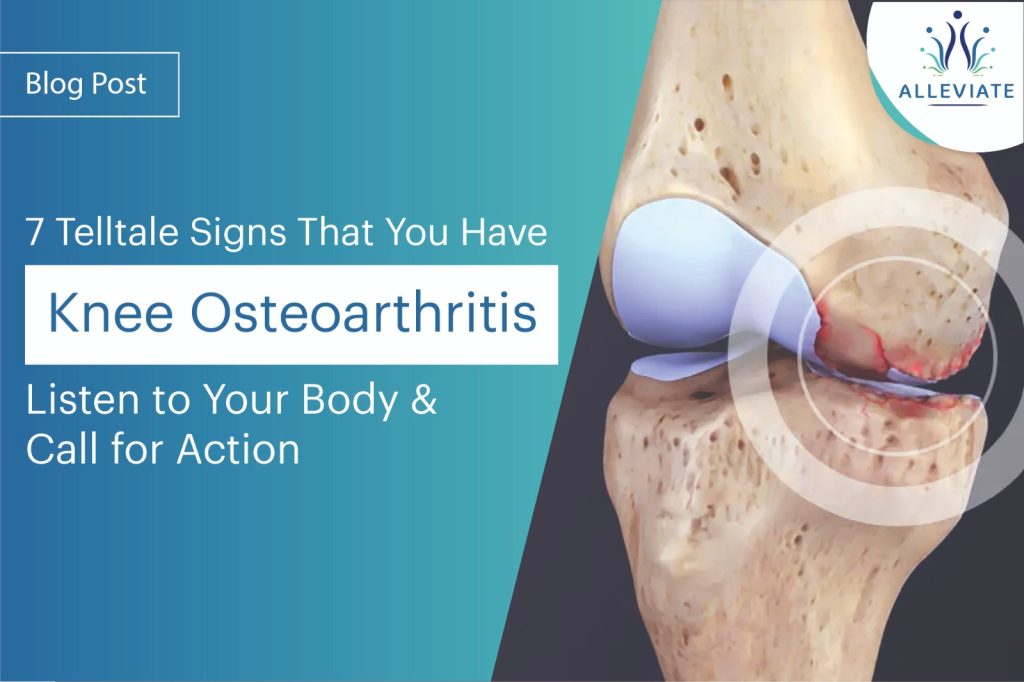Introduction
Knee osteoarthritis, a degenerative joint condition, affects millions of individuals worldwide. While it’s natural for joints to experience wear and tear over time, certain signs and symptoms can indicate the presence of knee osteoarthritis. Listening to your body’s signals and recognizing these telltale signs is crucial for early detection and effective management. In this blog, we’ll delve into seven key signs that you may have knee osteoarthritis, helping you understand when it’s time to take action and seek medical guidance.
- Persistent Knee Pain : Experiencing persistent knee pain, especially during movement or weight-bearing activities, is a prominent indicator of knee osteoarthritis. The pain might start as occasional discomfort and gradually become more consistent over time.
- Stiffness and Reduced Range of Motion : If you notice that your knee joint feels stiff, making it challenging to fully bend or straighten your leg, it could be a sign of osteoarthritis. Stiffness is often most pronounced after periods of rest or inactivity.
- Crepitus : Crepitus refers to a crackling or grinding sensation you may feel when moving your knee. This sensation is caused by the roughened surfaces of the bones rubbing against each other due to the loss of protective cartilage in the joint.
- Swelling and Inflammation : Inflammation of the knee joint is a common response to osteoarthritis. If you notice swelling, redness, or warmth around your knee, it’s essential to pay attention, as these symptoms can indicate underlying joint issues.
- Weakness and Instability : As knee osteoarthritis progresses, you might experience muscle weakness around the affected joint. This weakness can contribute to a feeling of instability or a sense that your knee might give way.
- Limited Activities : If you find yourself avoiding activities you used to enjoy due to knee discomfort, it’s time to take notice. A significant decline in your ability to participate in physical activities could be linked to knee osteoarthritis.
- Morning Stiffness : Experiencing stiffness in the knee joint upon waking, which eases as you move around, is a potential sign of knee osteoarthritis. Morning stiffness lasting for more than 30 minutes might indicate ongoing joint issues.
Recognizing these signs and symptoms isn’t just about identifying a problem; it’s about acknowledging your body’s call for action. Early detection and intervention can make a substantial difference in managing knee osteoarthritis and improving your quality of life.
When to Take Action
If you identify with any of the above signs, it’s crucial to consult a healthcare professional for accurate diagnosis and appropriate guidance. Seeking medical attention early can help determine the extent of joint damage and create a tailored treatment plan to address your specific needs. AT ALLEVIATE we do a thorough clinical and radiological assessment of the patient and depending on the severity of the condition, treatment options are proposed which can can range from lifestyle adjustments, physical therapy, pain management techniques, and in some cases, surgical interventions.Remember, your body’s signals are valuable, and ignoring them can lead to worsening symptoms and decreased mobility. Don’t wait for the pain to dictate your life—take proactive steps to understand your condition and work towards optimal joint health.
Conclusion: Empower Yourself with Knowledge
Knee osteoarthritis is a condition that requires attention and action. By recognizing these seven telltale signs—persistent knee pain, stiffness, crepitus, swelling, weakness, limited activities, and morning stiffness—you can empower yourself to seek timely medical assistance. Embracing early intervention and working closely with healthcare professionals can lead to effective management strategies, enabling you to regain control of your knee health and enjoy a more active and fulfilling lifestyle.
References
- Heidari B. Knee osteoarthritis prevalence, risk factors, pathogenesis and features: Part I. Caspian J Intern Med. 2011 Spring;2(2):205-12. PMID: 24024017; PMCID: PMC3766936.
- https://my.clevelandclinic.org/health/diseases/21750-osteoarthritis-knee
- Gupte C, St Mart JP. The acute swollen knee: diagnosis and management. J R Soc Med. 2013 Jul;106(7):259-68. doi: 10.1177/0141076813482831. PMID: 23821708; PMCID: PMC3704066.
- Approach to the adult with knee pain likely of musculoskeletal origin AUTHORS:Anthony Beutler, MDKarl B Fields, MD
- Bosomworth NJ. Exercise and knee osteoarthritis: benefit or hazard? Can Fam Physician. 2009 Sep;55(9):871-8. PMID: 19752252; PMCID: PMC2743580.
- Lespasio MJ, Piuzzi NS, Husni ME, Muschler GF, Guarino A, Mont MA. Knee Osteoarthritis: A Primer. Perm J. 2017;21:16-183. doi: 10.7812/TPP/16-183. PMID: 29035179; PMCID: PMC5638628.





